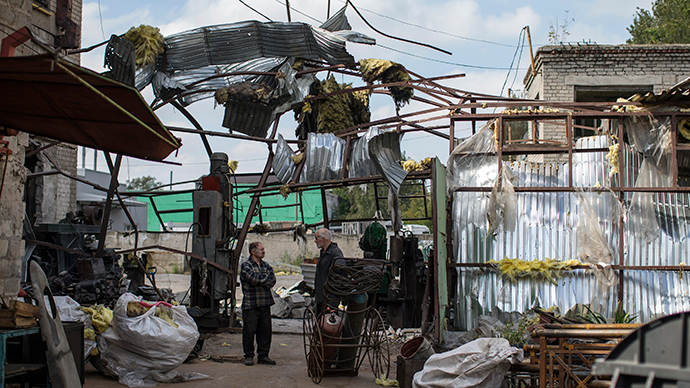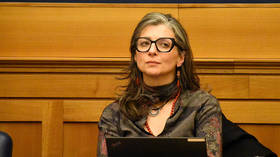Ukraine is broke – and winter is coming…

Ukraine is broke, and that's the sad legacy of this year's tumult. The question now is: will its western “friends” and Russia save Kiev from the abyss?
One day, during the credit-fueled economic madness of the early Noughties, I got a credit card in the post. I hadn’t ordered it: the bank had just forwarded it without any prompting. That sounds crazy now, but was considered normal back then. I was a student and it wasn’t Christmas, but it sure felt like it. Armed with my plastic pal and its €3,000 limit, I hit Dublin’s luxury Brown Thomas store and purchased designer gear with all the intent of a puppy on amphetamine.
A few raucous nights out followed, “More champagne? No bother!” and a trip to Paris. Then reality dawned and I had to pay it back. That wasn’t fun – in fact, it was extremely difficult. However, while grazing on baked beans and toast, I had my memories of the “good times.”
Countries often experience similar short-term periods of paper wealth, followed by a humongous hangover when the debt collectors come calling. There are a myriad of current examples in Europe: Greece, Spain and my own Ireland for starters. Others didn’t have much of a party, but still got the furry tongue – Hungary, Cyprus and Portugal spring to mind.

Nevertheless, there is one European state that bucks all trends by having had no shindig at all before getting its medicine from the markets – Ukraine. That is, unless you count a civil war, a violent revolution and a horrifically divided nation as a party. Incredibly, some in Ukraine actually do. To them, Maidan and its consequences is all a big celebration. Well, the hijinks are over now and the DJ has just played “My Way.”
Ukraine is broke. It was already treading water before the “revolution” – helped by corruption that ranged from the small scale to the incredibly large. Now, however, it’s completely banjaxed. Meanwhile, the “do-gooders” in the mainstream media ignore this while they crack on about “nation building” and “reforms.”
That’s all great stuff at think tanks and in newspaper columns, especially when you have a western salary, but it’s not much use when you are a Ukrainian living in Lviv. They can’t easily scuttle off back to New York or London – or even Moscow – when the global press gets bored of the story. They have to stay in Ukraine and live there and try to make ends meet in a bankrupt country. That’s not fun at all, unless you are the type who finds having your fingernails pulled out by pliers pleasurable.

The “friends” from the western media and the think tank rackets won’t be around for the drudgery of the recession. No, they’ll be off to cover the next big story, while the locals they espouse “European values” to will be sitting in their kitchens trying to figure out how to pay for groceries. They might take solace from their departed “friend from America” telling everyone in NYC hipster bars “how nice and stoic the Ukrainian people are,” but consolation won’t fill the fridge.
How broke is Ukraine? On a scale of one to 10, I’d venture 10 and a half. What the well-meaning idiots from abroad haven’t talked about is how dependent Kiev’s economy is on Russia. In 2013, more than 60 percent of their exports went to post-Soviet countries. Meanwhile, export levels have, officially, fallen by a gigantic 19 percent already this year (and the real figure is probably much worse).
Also, what little high-end manufacturing Ukraine had was almost entirely beholden to the Russian military-industrial complex. An example is Antonov, the famed aircraft maker, which recently had to write off $150 million when it couldn’t deliver an order to the Russian Air Force. Antonov’s planes can’t compete in western markets, so without the Russian market the company is finished. Good news for Komsomolsk-on-Amur (the home of Sukhoi) in Russia’s Far East, but a tragedy for the 12,000 employees of Antonov, near Kiev.
I'm not sure how Roshen Chocolates is doing, but with a $1.3 billion fortune, its owner, oligarch Willy Wonka, or President Petro Poroshenko as he's better known, won't be going hungry. He's one of the lucky ones.

Industrial production has fallen off a cliff in Ukraine, down over 20 percent already this year and retail sales aren’t far off, at about 19 percent. Foreign currency reserves have collapsed by around 25 percent, even with emergency IMF funding. Yet, that’s not even close to the largest concern. This would be the currency, the hryvna, which crumbled by 11 percent against the dollar last Friday alone. A year ago, the rate was around 8.1, it’s now a startling 13.5. Great news for those paid in greenbacks, but 99 percent of locals are remunerated in hryvnas. Inflation is north of 14 percent and is set to increase dramatically in the short-term as the currency is geared in only one direction.
Winter is coming, and anyone who has been in Kiev in January can tell you how shivery that gets. It’s a special variety of biting cold and it takes more than North Face – for the few can afford it – to survive the onslaught.
Ukraine imports 80 percent of its natural gas – and most of that comes from Russia. A real problem here is that Kiev currently owes Gazprom, Russia's state gas giant, $4.5 billion. In fact, Ukraine’s single most profitable export service (worth $3 billion annually) is transit fees for Gazprom’s access to other European markets. This is what is known as a “double bind.”
I didn’t mention the IMF loans yet. They are not “aid” – and they must be repaid. The latest guarantee was around $20 million and there have been suggestions that a sizeable portion has been looted by kleptocrat insiders already. The IMF’s Articles of Agreement forbid it to make loans to countries that clearly cannot pay. Unless the agency is willing to tear up its rule book – thus making Greeks the happiest people alive – it’s clear that emergency funding from that source is also about to grind to a halt.
Where else can Ukraine get cash from? Waging civil war is expensive and the chickens are now roosting. Not to mention that much infrastructure has been destroyed this year and will have to be rebuilt. As President Poroshenko’s peace accord keeps the troublesome Donetsk and Lugansk regions inside Ukraine, that duty will surely fall to Kiev. A quarter of Ukraine’s exports are derived from the eastern provinces – but Poroshenko has bombed Donbass’s industry and left its coal mines without electricity.
Many economists now believe that Ukraine will soon default. Right now, it’s unclear how to even begin to mount a recovery because the figures just don’t add up, no matter how fancy the calculator. This winter, with the cold wind of economic malaise blowing, Ukrainians won’t have much to celebrate. Maidan’s supporters can fondly look back at that moment when so much was promised, but so little delivered.
As one gang of oligarchs were deposed to facilitate a new team of oligarchs to take power, those ebullient protests seem far away now. Will those memories be enough to sustain the country through winter? I doubt it.
Ukraine has already been broken. Now it’s actually broke. The three external parties who squared off around the nation’s carcass – Russia, the US and the EU – have a moral responsibility to fix the mess. Will they put enmities aside and club together to do the right thing? Let’s see. I’m not holding my breath.
The statements, views and opinions expressed in this column are solely those of the author and do not necessarily represent those of RT.
The statements, views and opinions expressed in this column are solely those of the author and do not necessarily represent those of RT.













